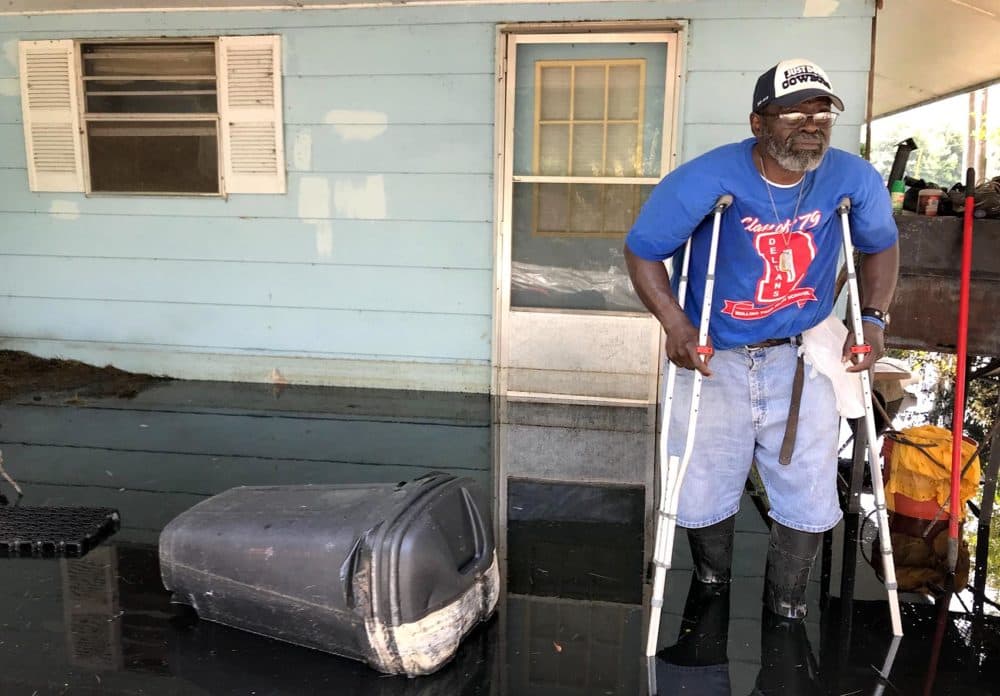Advertisement
'I Tried To Stay And Hold On As Long As I Could': Returning To A Flooded Mississippi Home
Resume
Anderson Jones woke up at 2 a.m. on the morning of May 19 and knew it was time to leave.
The rising floodwaters had been threatening his house in the Mississippi Delta since February. But now, the sandbags were failing.
"I wasn't going to leave until the water practically got into my house," says Jones, 59. "I tried to stay and hold on as long as I could."
Jones lives near the small town of Filter, Mississippi, a community of farms in an area known as the Yazoo Backwater where soybeans and corn would normally be growing tall this time of year. The water has changed all that. Many farmers will go the entire season without planting a crop for the first time in their careers.
The deluge has destroyed homes and livelihoods up and down the Mississippi River this spring. Gauges near Vicksburg, Mississippi, have been above flood levels for 110 days. The river hasn't been this high for this long since 1927.
Jones hasn't been back to see the damage since the morning he left home and boated to higher ground. He left his dogs behind "because they really guard that house," he says. But with more rain in the forecast, Jones says he needs to get them to higher ground.
A Backwater Like A Bathtub
More than 550,000 acres in the Yazoo Backwater area are underwater, and likely will be for another month at least. This part of the Delta is hemmed in on both sides by a ring of earthen levies. It's like a bathtub with a clogged drain.
When the Mississippi River is too full, the water in the tub has nowhere to go.
"We've got 86 miles of county roads, and if you took every little dry spot that's not underwater, out of 86 miles, I might have a mile and a half that's not underwater," says Eddie Hatcher, an Issaquena County supervisor. "I have people who have been out of their homes living with friends and family members since February. People don't understand just how bad this is until they come see this damage."
Hatcher and Jones say the problem could have been avoided — as does just about anyone who has been living with the water since February. In 2008, the Environmental Protection Agency vetoed a pumping project that had been planned for decades. The pumps would have sucked the water out of the "bathtub," but environmental groups said they'd also dry up pristine habitat for birds and fish.
"I have people who have been out of their homes living with friends and family members since February."
Eddie Hatcher, an Issaquena County supervisor
The project died. And people are still mad about it.
"It's been slow mental torture," says Ann Dahl, a homeowner in Eagle Lake, Mississippi, who supports an effort to bring the pump project back to life. "It's just a travesty to the point of almost being criminal."
Destruction Up Close
Anderson Jones' dogs were wild-eyed when the boat arrived at his front door. They had been living on top of the wall of sandbags that surrounded his house. A friend had been checking on them, and leaving food, but they were matted and filthy.
When Jones arrived, a little mutt named Patch whined with stress — or excitement — and then jumped down from the wall to take drink from the water. It was black because the septic tank had backed up and flooded the home with sewage.
"It's my whole life — born and raised here," Jones says, absorbing the magnitude of the damage.

Conditions inside the home are even worse. Jones opens the side door to his kitchen and walked into ankle-deep septic water. Mold was crawling up the cupboards and along the countertops. His new stove was ruined. The air was thick and hot, but he walks deeper into the house anyway. Light streams through a window in his daughter's bedroom, revealing the stagnant nightmare it has become.
"Trying not to shed no tears," Jones says.
This has happened before. Jones says the home flooded and his family rebuilt in the early 1970s.
"Gotta do like my daddy," he says. "Have to clean it out, fix it over."
He has flood insurance, but first, the water has to go down and he has to get the dogs to higher ground. He'll take them to the run-down building where he grew up going to church, put food on the shaded porch step and go to Jackson where he's been staying with his sister.
"You gotta teach your children not to run every time something blows by. Keep what you got," he says, promising to come back in few weeks when the water goes down. "All you gotta do is trust God."
This segment aired on June 7, 2019.
